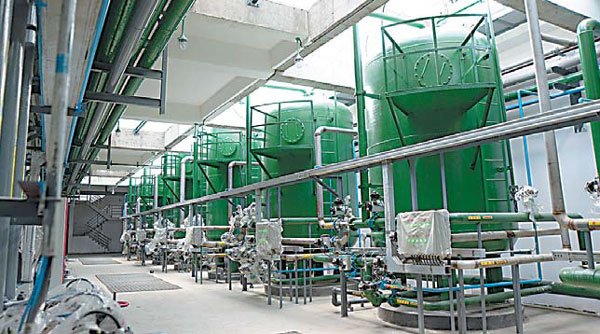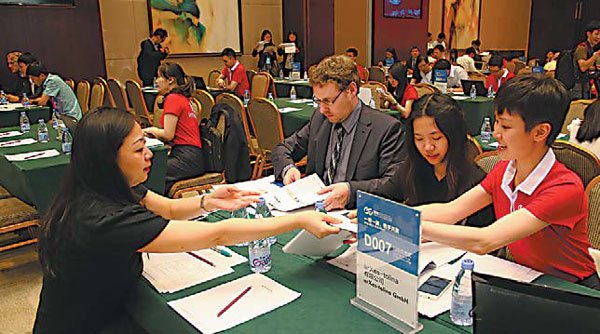
Location:Home > News > Media Reports > Germany shows its metal in new ecological city
Source:Chinadaily.com.cn Author:Chinadaily Date:2015-06-26

The opening ceremony for launching the communication website for Chinese and German small and medium-sized companies in Jieyang. Photos provided to China Daily
Relationship that got off to a cold start blossoms with a plethora of agreements and the founding of a model for sustainable living
When a group of Chinese businesspeople from Jieyang, Guangdong province, traveled to Germany on a fact-finding mission in 2012, the cool reception they received was befitting the snowy winter weather there. They didn't know anyone in Germany, and for all the doors they knocked on, they were granted barely any attention, let alone welcoming handshakes. But what had seemed like the wasted effort finally bore fruit in early June when 200 German businesspeople flew to Jieyang to explore collaboration opportunities with local businesses.
They were attending a conference on collaboration between German and Chinese small and medium-sized enterprises in which 400 businesses took part, of which 122 were from either Austria, Germany or Spain, and at which 105 items of advanced technology were presented.
Over the two days, 34 contracts and 30 memorandums of understanding were signed, a communication website for Chinese and German companies was launched, and other projects were put in train.
Apart from promoting collaboration between Chinese and European companies and bringing 100 German technical engineers to China, the aim of the conference was to promote a 10 billion yuan ($1.6 billion; 1.4 billion euros) fund to develop SMEs.
"Whether it be Chinese companies or German companies or European companies, we all need tools that can improve communication, something that one company alone cannot achieve," says Gao Huiming, a Jieyang businessman who attended the conference.
Gao says that in 2011 he sought advanced technology in Germany to upgrade his cold-rolling metal factory, but failed to find it. It was not until 2013, with the help of the local government and an industry association that he came up with a way of generating power, by combining the use of low-temperature waste heat with a steam expansion engine, with a German company, he says.
Jieyang, in northwestern Guangdong, and with a population of 6.6 million, is well-known in China for producing industrial hardware. Metal is the city's pillar industry, one in which more than 7,000 companies have a stake and one that has brought prosperity to the city, but that has caused heavy- metal pollution on a large scale.
Liu Feizhou, vice-president of Zhongde Metal Group Ltd, says that three years ago the Jieyang government and the city's businesses wanted to learn about German's best practices in industrial transformation.
"The aim was simple: to solve pollution and advance transformation. If you can't solve pollution, there is no long future for businesses, and we are not going to be able to look at the next generation in the eye," Liu says.
When the businesses made their trip to Germany in November 2012, they were impressed by what they saw, he says.
"Germany's Rhine was heavily polluted 30 years ago, but when we saw it, it was really clear."
Because they had almost no contacts there, they were reduced to inspecting factories from the outside, and were highly impressed with the expanses of greenery.
"We noticed that nail clippers made and sold in China for 2.5 yuan sold in Germany for 10 ($11.30) or 20 euros," Liu says.
One of the business people paid more than 100,000 yuan for kitchen utensils, even though his companies make similar products.
"German design and quality impressed us, and we were thinking, 'Why can't we make this?'" Liu says.
When the businesspeople returned to China they and the Jieyang government began to seek support from the national government to build connections with Germany industrial associations and companies.
Liu says that with China's growing influence in the world, and particularly since Europe has gone through its financial crisis, more companies in the continent are interested in China.
Many big German brands, such as BMW, Mercedes-Benz, Siemens and Volkswagen, have been successful in China, he says, but SMEs, some with only 10 or 20 workers, lack the ability to explore China by themselves, and they need to find local partners.
"More than 99 percent of German companies are SMEs that specialize in a certain area and have the latest technology," Liu says.
"Chinese SMEs are similar. They want good technology, but they lack the resources or ability to find the right partners overseas."

A factory inside the Sino-German Metal Eco City in Jieyang.
Now Jieyang is building Sino-German Metal Eco City, a pilot area for sustainable living that makes the most of China and Germany working together. The city would draw heavily on high technology and seamlessly integrate industry, human habitation and human services, while respecting the environment, Liu says.
It is a joint effort of Zhongde Metal Group Ltd, thousands of whose shareholders are metal enterprises, and its German counterparts, in conjunction with local authorities. It covers about 25 square kilometers and will cost more than 150 billion yuan.
Eighteen German companies have already set up operations in the city, and when construction is finished in 2020, it is expected to generate revenue of hundreds of billions of yuan a year.
The plans have the backing of the national government, which recently unveiled its Made in China 2025 action plan, aimed at improving the country's manufacturing competitiveness.
In March a German recycling company, Alba Group, and the government of Jieyang agreed to jointly set up the Sino-German Resources Recycling Center, thus making Alba the first German company to set up operations in Sino-German Metal Eco City. The signing ceremony was witnessed by President Xi Jinping and the German chancellor, Angela Merkel.
Axel Schweitzer, chief executive of Alba Group, with headquarters in Berlin, says he has done business with China for more than 20 years but that little attention used to be given to waste treatment. In 2011 the company introduced its recycling technology to China, and Schweitzer and his family now live in the country.
"Waste is always a mirror for production and consumption For a few years now China has been the world's biggest producer of waste, and the amount will grow by 50 percent over the next 10 years."
Alba says it is one of the largest companies in the world offering environmental services and resources generation, and the materials it handles include domestic refuse, electronic waste, industrial waste, plastics and scrap metal.
The company says it wants to localize its third-generation technology of transforming domestic refuse to "green coal" for China.
Schweitzer says Alba grew in Germany over many years and witnessed the country solve its waste and pollution problems. China's environmental conditions are similar to those of Germany in the 1960s and 1970s, he says.
"With our experience we understand what problems China is likely to meet over the next 10 or 20 years, and our technology and solutions will be helpful."
Alba says it had revenue of 2.5 billion euros last year, about a quarter of that generated in China. Its factory in Sino-German Metal Eco City covers 10 hectares, and about 3 billion yuan has been invested in it.
"With the environment at the top of the agenda in the government's development plans, there is a great opportunity for us to localize technology and products in China," Schweitzer says.
Eric Schweitzer, president of the Association of German Chambers of Commerce and Industry, who is Axel Schweitzer's brother, says German companies are confident about the Chinese market.
"We have about 3,000 German companies in China, and a survey we have done showed that about 40 percent of them planned to increase investment in China. As China's economy grows, people will be better-off and they will want a better environment. This transition offers opportunities for German companies, and German technology can play an important role during the transition."
Government policies and regulations are also important, he says. When German companies introduce their technologies to China, it is important that their intellectual property rights are well protected. In designing the city they have set up an office specializing in intellectual property rights.
For SMEs everywhere, financing is always a problem, Schweitzer says, and he is happy such companies are receiving financial backing in Jieyang.

Businesspeople hold trade talks during the conference on collaboration between German and Chinese small and medium-sized enterprises in Jieyang.
Bauku Bau und Kunststoffrohr GmbH, established in 1956, is a big investor in twined pipes and is a major drafter of German pipe standards. The company owns a complete industrial chain comprising equipment manufacturing, pipe manufacturing, pipe network planning and design and application software copyrights, and offers solutions for urban waterlogging and pipe network reconstruction in Europe.
Ning Haomin, general manager of the (Guangdong) Bauku Intelligent Pipeline System, a joint venture of Bauku and Jieyang KCL Technology, has an intelligent pipeline system project in the new city, with total investment of 1.8 billion yuan. In five years, the company forecasts, the project will generate 60,000 tons of product and have revenue of 2 billion yuan a year.
"China has grown so quickly that in city planning many things we designed five or 10 years ago could not meet the demand now, such as the width of roads and underground piping," Ning says.
The market for underground pipes in Germany cannot be compared to that of China, especially for large networks, Ning says.
"The joint venture will innovate using what Bauku has in Germany and upgrade the technology, the network and the system to meet the requirements of China's city planning as urbanization continues apace, especially in infrastructure construction."
Ning says that in high-end industries, China lags in setting standards, which makes it difficult to introduce good Western technologies to the market. The Jieyang pilot program has been innovative in welcoming Bauku's pipe networks, he says. The factory will start production this year, and will be able to generate about 10,000 tons of products a year. The company also aims to help set up industrial standards in China.
Dieter Hundt, former president of the Confederation of German Employers' Association, says Chinese and German SMEs have great potential for growth. Many big German companies have already expanded their manufacturing operations in China, he says.
Many are likely to ask their suppliers, usually SMEs, to set up operations in China, too. For example, motor vehicle makers and equipment makers would want their core parts suppliers in the country. This is another reason to promote German SMEs in China, Hundt says.
German companies are facing stiff competition, and it is important that they take part in the global market, especially in emerging markets that have great economic potential, and China is now the No 1 market, he says.
"These days more and more Chinese companies are active in Germany in mergers and acquisitions of German companies, and as a result the impression German businesspeople have of Chinese companies is changing."
Eric Schweitzer says Germany is also seeing more Chinese investment. Last year Chinese companies invested in 190 projects in the country, in sales, production and research and development.
an>Add:Floor 21, Honghe Building, Jieyang City, Guangdong Province Code:522000 Tel:4008941333 Fax:4008875666-159888
- Copyright © 2026, ZhongDe Metal Group Co., Ltd.. 粤ICP备13042188号-1
- Links:MEUJ OF JIEYANG | Zhongde Metal | ZhongDe Metal Eco-City




